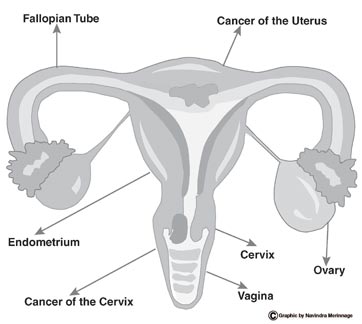Keeping Cervical Cancer at bay
Plans are underway to vaccinate school girls against
Human Papilloma Virus and Dr. Mahendra Perera explains why it is a good
thing:
by Nadira Gunatilleke
|

Dr. Mahendra Perera |
The Minister of Health and Indigenous Medicine and the Epidemiology
Unit are looking into the possibility of vaccinating school girls
against Human Papilloma Virus (HPV), the main cause of cervical cancer
in women. This was announced during a recent press conference held at
the Epidemiology Unit under the patronage of the Chief Epidemiologist,
Dr. Ms. Paba Palihawadana and Director General Health Services, Dr.
Palitha Mahipala.
Here, Dr. Mahendra Perera (MBBS, MD, Dip. RT, Consultant in Clinical
Oncology and Radiotherapy), President of Sri Lanka College of
Oncologists and Chairman of the Board of Study in Oncology and
Radiotherapy in Sri Lanka, member of European Society of Therapeutic
Radiology and Oncology and the Principal Investigator of Clinical
Trials, NCIM, talks about cervical cancer, who is susceptible, early
detection, treatment and the importance on vaccinating the young girls
against this second most commonest forms of cancer.
Excerpts.
Q: What is cervical cancer?
A: It is a malignant growth arising from the Uterine cervix
(Neck) of the female genital organs.
Q: How do females get this form of cancer? Who are at risk?
What is the current situation in Sri Lanka?
A: A majority of females get this form of cancer from a virus
called the Human Papilloma Virus (HPV), transmitted through an infected
partner during sexual intercourse. There is a small portion of women who
get it by unknown causes. So the women who enter in to active sex life
early in their lives and having contact with multiple sex partners are
at risk. There are also some associated risk factors like smoking, low
socioeconomic status, higher number of childbirths and birth control
pills.
Cervix cancer is the 2nd commonest cancer in females in Sri Lanka. It
is most of the time detected at Stage 3, which is a very advanced stage
and which is not completely curable. Once detected in early stages, it
is curable either by surgery or Chemo-Radiotherapy. This is the
importance of doing a PAP smear testing in Well Women Clinics in
detecting the cervix cancer early. The PAP smear Test is a mandatory
part of cancer screening.
Q: What are the steps that can be taken to prevent cervical
cancer in women?
A: 1. Educating the patients about early symptoms; Unexplained
discharge from vaginal passage, bleeding from vagina between menstrual
cycles, repeated bleeding after sexual intercourse, pelvic pain, leg
swelling, or unusual loss of weigh
2. PAP smear testing
3. Making women aware of risk factors explained above
4. Vaccination against HPV (Human Papilloma Virus)
 Q:
The Epidemiology Unit of the Ministry of Health and Indigenous Medicine
is considering vaccinating school girls against cervical cancer (may be
under the National Immunization Programme) in future. Is this a wise
move? Q:
The Epidemiology Unit of the Ministry of Health and Indigenous Medicine
is considering vaccinating school girls against cervical cancer (may be
under the National Immunization Programme) in future. Is this a wise
move?
A: Yes, Most certainly it is.
Q: How it should be done?
A: A target group should be girls before they become sexually
active. It should be incorporated in the immunization scheme and
carefully explained to the mothers and the daughters. It is important to
explain to the low intelligent groups that it is not an assurance or
insurance for prostitution.
Q: Is there any risk factors/negative impact?
A: The only negative impact is among the low intelligent
groups who would consider the vaccination to be some sort of protective
factor for engaging in sex with multiple sex partners. There is no
serious risk events reported as such when compared to the positive
effect of vaccination against HPV, which would prevent more than 85% of
Cervical Cancer in women. |

